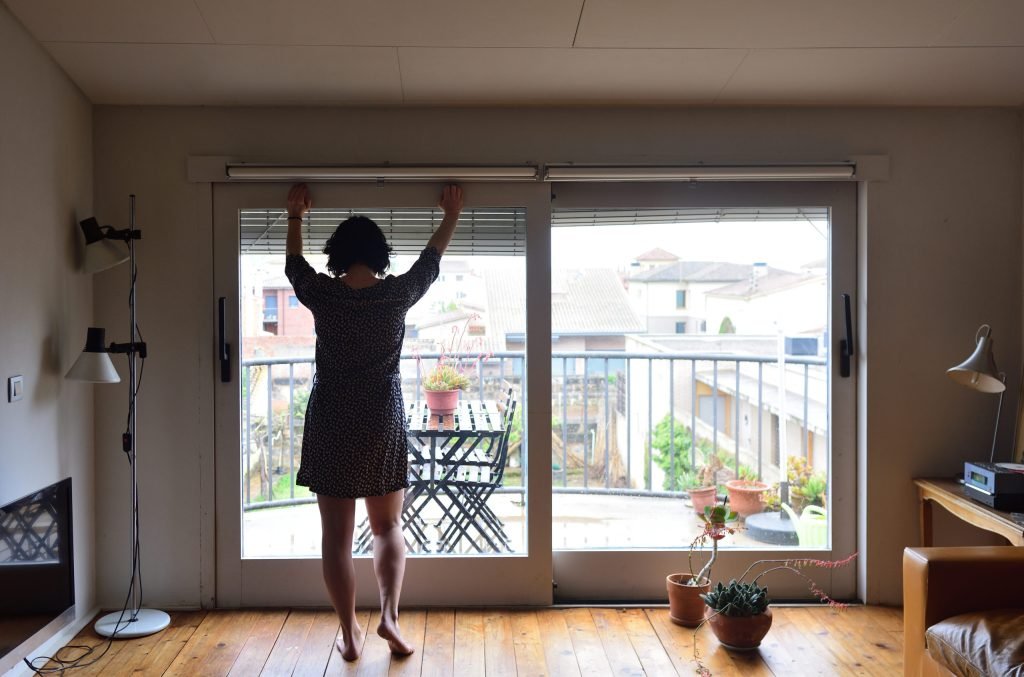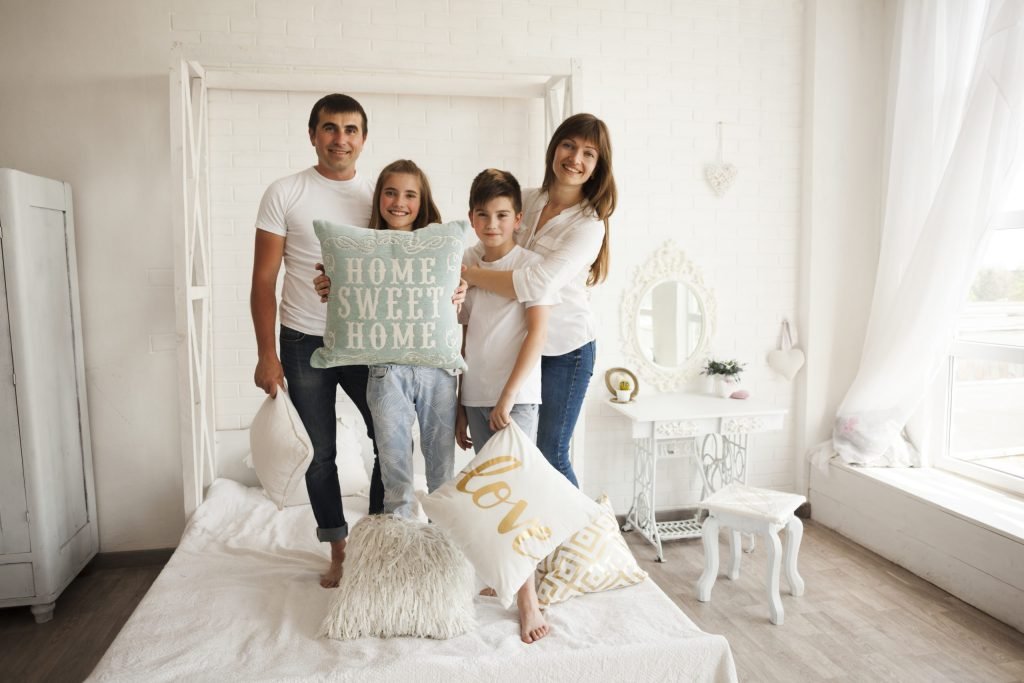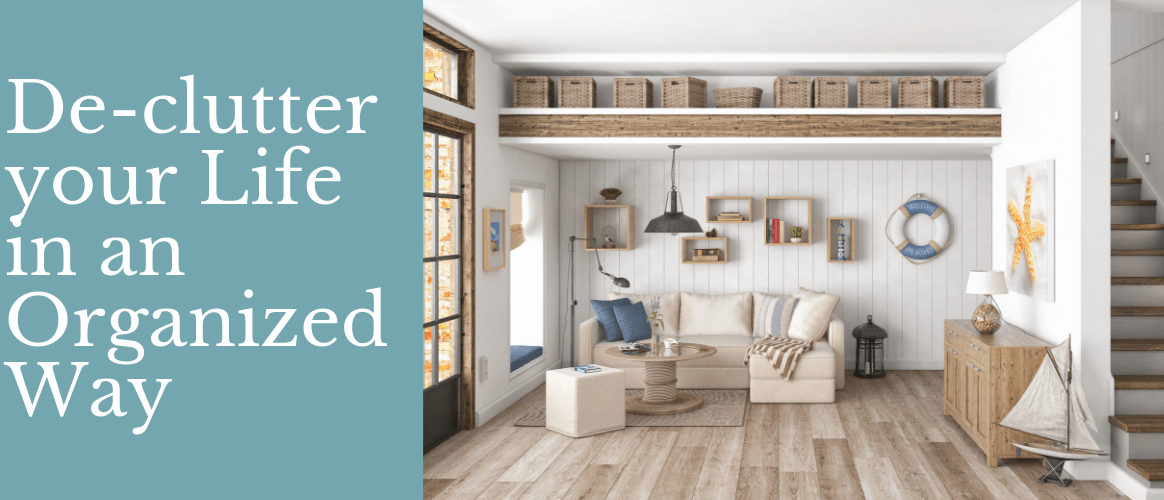Declutter Your Life in an Organized Way- Ultimate Guide
De-clutter your Life in an Organized Way
De-cluttering your physical space can have an amazingly uplifting effect on your mood. Feng Shui experts claim that buildings and furniture store the memories of events in the form of energy, and that by de-cluttering you can clear the energy of historic traumatic events. Whether or not you put any store in that kind of theory, nobody who has ever de-cluttered a space could deny the positive benefits of increasing the physical space in their environment.
However, physical de-cluttering can also have a cathartic effect on people emotionally. When we let go of things we’ve been hoarding for a long time, we often let go of emotional memories we’ve been hanging onto along with them (albeit unconsciously), and so by clearing physical clutter you can clear space in your head and in your heart as well as your home.
Clutter though is not only physical. We can also have mental and emotional clutter blocking the flow of energy in our lives and clearing this out is guaranteed to help improve our emotional well-being. Examples include undone/unfinished tasks; people/activities that drain you of energy; remaining angry at people; busyness – filling up your schedule with activities you feel duty-bound to do, and leaving no time to nourish your soul and refresh your body.
Some Tips for Clearing Your Physical Clutter:
Prioritize Areas
- Look at your home and identify the areas that need de-cluttering.
- Sit down with a notebook and make a list of all the rooms. Include non-rooms such as hallways and the entryway.
Choose Area Size According to Available Time
- Decide how much time each day you can devote to the task of de-cluttering. If you have entire days to spare, you might be able to take on a room per day. If you are like most people and have several responsibilities to juggle, then it might be more reasonable to tackle small areas within a room within a short time frame.
Set Time Goals
- Once you decide how much time you have to work and set your timer. The first time we suggest setting aside a minimum of one hour (an hour and half or two hours would be even better). As you become more comfortable with the process, you will be able to make progress in shorter blocks of time. Allow 10-15 minutes to “tidy up.” If you have 1 hour to declutter, set your timer for 45 minutes.
- If you are giving your self timelines in hour’s why not use minutes instead when you assign yourself an assignment to do in 2 hours you may do it leisurely because 2 hours seems like a long time but try and say that the task needs to be completed in 90 minutes. 90 minutes may seem long but in essence they are shorter and you are able to complete the task in 90 minutes as opposed to two hours. Setting realistic goals is essential declutter your life.
Break Down Each Area into Sections
After you have decided how much space and time you are likely to be able to clean each day, break each room down into areas such as closet, desk, floor, etc. Make the sections small enough that you can complete your task in one day or in the time frame allotted. Whether it gets accomplished in twenty minutes or four hours, you will feel satisfied that you have finished the task you assigned to yourself.

Enlist Some Help from Family and Friends
Ask an especially organized family member to help you, or arrange for a de-cluttering swap with a good friend. Involve them in the planning process, and of course when it comes to the actual physical labor as well. Make it fun, and order pizza for everyone afterward. Most friends are happy to help out when asked, and you can always return the favor in the future.
In the section below I go more into depth on how to get the family to help out.
Divide Stuff into Different Piles
Go through your stuff and for each item ask yourself:
- Do I love it? Do I need it? Do I use it? If you can answer yes to any of them, it stays. If it’s no to all, then it goes.
- Divide everything into four piles: Keep, Recycle, Donate and Dump. As soon as you’re done, remove the items that aren’t staying straight away and deliver them to their new destination.
- Once your big clear out is done, avoid a new build up by clearing out little and often.
Be Realistic and Flexible
We can set goals but sometimes life gets in the way. Don’t beat yourself up if you don’t reach your goal one day, or if you have to reschedule due to life events. Even if it takes longer than planned, your de-cluttering will eventually come to an end if you stay consistent and stick to it. If you miss one day, simply get back to it the next.
Set A Reminder
Set a reminder in your smartphone or find another way to get into the decluttering groove without forgetting about it. Be flexible about your schedule if for some reason you should need one room to be decluttered sooner than originally planned, even if it means putting off another room. As long as you are doing something almost every day, you are headed in the right direction.
Decluttering takes organization.
Prioritizing your task means that you will be able to get everything done in a timely fashion. Use these ideas and get on your way to an organized decluttering spree today.
Tips for Clearing your Mental/Emotional Clutter:

Make a list.
- The list will consist of anything you’ve been procrastinating over and ask yourself why you have been putting it off. What can you tackle and what can you let go of? When you’re clear on what you definitely have to be done, make a plan and get to it.
Stop worrying.
- There is nothing constructive about worrying – it won’t help you avoid the outcome you’re worrying about and it’ll destroy your ability to enjoy the present. When a worrying thought arises, squash it straight away and sing along with me “Everything’s gonna be alright, I can and will make it right…” Focus your energy on what you’d like to happen instead.
Follow through on promises and commitments.
- When you’ve said you’ll do something, but you keep putting it off, it drains you of energy. If you can’t or don’t want to see them through, then be upfront about it and withdraw your promise.
Let Go Of Anger And Forgive.
- When somebody hurts you badly, it’s a normal response to feel anger, and to not want to forgive. But anger is bad for your health, both physical and emotional, so it’s actually in your interests to let it go and forgive the other person. Forgiving them doesn’t mean you have to welcome them back into your life with open arms, it just means letting go of the memory of what they’ve done to you and the feelings that go with it. Maybe the other person doesn’t deserve forgiveness, but don’t you deserve to move on and leave the pain behind?
Say No To People And Activities That Drag You Down.
- Instead, surround yourself with people who uplift you and do things that make you feel great! Get rid of toxic people that you can’t help and will only bring you down. I am not saying you shouldn’t be understanding and compassionate, I am saying protect your mental health first.
Develop Clutter Free Habits.
- As with your physical clear out, don’t make this a once-off project or an irregular purge. Develop clutter free habits in every aspect of your life, and you will enjoy an easier flow through life on a continuous basis.
Giving Every Item a Logical “Home” After Major Decluttering
As you declutter your home, and after you are done, there are several secrets that will help you to keep it looking spotless long after you have finished your task. One of these secrets is to give every item a logical home. Here is how to use this step to your advantage in your quest for clutter-free living.
Why Items Need a Logical Home
You may have all the items you could ever need or want, but if you don’t know where to find them, there is no point having them at all. Giving each item a home means that you will always know where to return something when you are done with it, and then when you need it again you will be able to find it easily and immediately.
Giving each item a logical home means that you don’t just choose a random spot for it to be stored, but rather store it in a place that makes sense. This way, if you forget where your item is, you can think about where it should be and find it without wasting too much time.
Starting Off with a Clean Slate
The best time to give multiple objects a home is when you have just done massive decluttering. Now that your home is purged and ready to be organized, find storage places for all your items that make sense to you personally. There’s no point in trying to organize anything at all when you have too many things around that need to be given away or discarded.
Giving Each Item a Room
Observe the items that you have chosen to keep. Decide what room you are generally in when they are in use. Things such as scissors, paper and pens will likely go in your office – or if you don’t have a designated office, your living room.
Things pertaining to sleep or clothing will likely be stored in the bedrooms of those whom they belong to. Kitchen items always belong in the kitchen. Continue on in this way until all your items are sorted into rooms.
Giving Each Item a Particular Spot in the Room
Now that you have a room for each item, choose a particular place for it. Your bedroom might have a closet and shelves for clothing, a section in your closet for jewelry, and one drawer chosen for odds and ends. Try to keep similar items like shoes all in the same place so that when you are in a hurry to leave home, you don’t have to look through the entire house to find the pair you need.
As you take these steps, remember that wherever you choose should be obvious and make sense to you and anyone else who lives there. For example, store your piano books in a small book rack beside the piano, rather than on the other side of the room. This seems fairly obvious, but it deserves repeating because this organization rule is broken so often.

How to Get the Family on Board When It’s Time to Declutter
Decluttering is difficult enough when there is only one person involved. Bring in an entire family, and it can become a nightmare. Here are some ways that you can encourage your family to declutter together to create a beautiful home to live in.
Explain Why it is important to declutter your life
It’s not enough to simply demand that your partner and children help you clean without giving any explanation. Talking about why you want to declutter is important, because it will help keep motivation when the actual work begins to get tedious.
Explain to your children that you wish to have an inviting home that they can invite their friends to more often, and that there will be more time for fun activities when everyone keeps on top of the cleaning duties. Remind them that decluttering old items leaves more room for new ones.
Get Everyone Involved
From young to old, there is something that can be done by everyone. Let the adults take care of any dangerous tasks, such as climbing the ladder to the attic to get more boxes, and give out the high-energy tasks to older children. Let your little ones sort through toys and pick out which ones they would like to keep and which ones they would prefer to toss.
Leave Out Young Ones If Necessary
Although it’s nice to get the whole family involved, there will be times when it is necessary to remove your younger children if your decluttering duty is turning into a heartbreaking drama. If your toddlers and preschoolers are having a difficult time entertaining the idea of giving away any of their things, or if they are unpacking items faster than you can get rid of them, it’s time to call in special help.
See if it is possible for your young ones to go to Grandma’s for the day, or if you can swap childcare with a friend who is looking for a day off sometime in the near future.
Keep It Positive
The amount of enthusiasm you will receive from your family can be influenced by the manner in which you bring up the idea. If you start barking orders and making threats, you can immediately say goodbye to any happy family time you were hoping to experience in these moments. However, if you stay positive and remain consistently encouraging to each family member, you can all enjoy the process together.
Use Rewards
You may not believe in bribes, but a little reward can go a long way. Let your kids know that when everyone has worked together and completed the task at hand, you will all go out for an ice cream. Or if you are hosting a garage sale in hopes of selling some of your items, give a percentage of the proceeds to your children in payment for their assistance and cheerful attitudes.
Decluttering is a necessity when raising a family. Aim to declutter your entire home at least once a year, to make room for what the next one will bring in. With a little enthusiasm and a lot of team spirit, you can motivate your family to get on board with decluttering.
If you are not a natural organizer, it can be a challenge to become one. With a little time and practice, however, you will get there. By using these simple steps, your organizational ability will grow in leaps and bounds.








